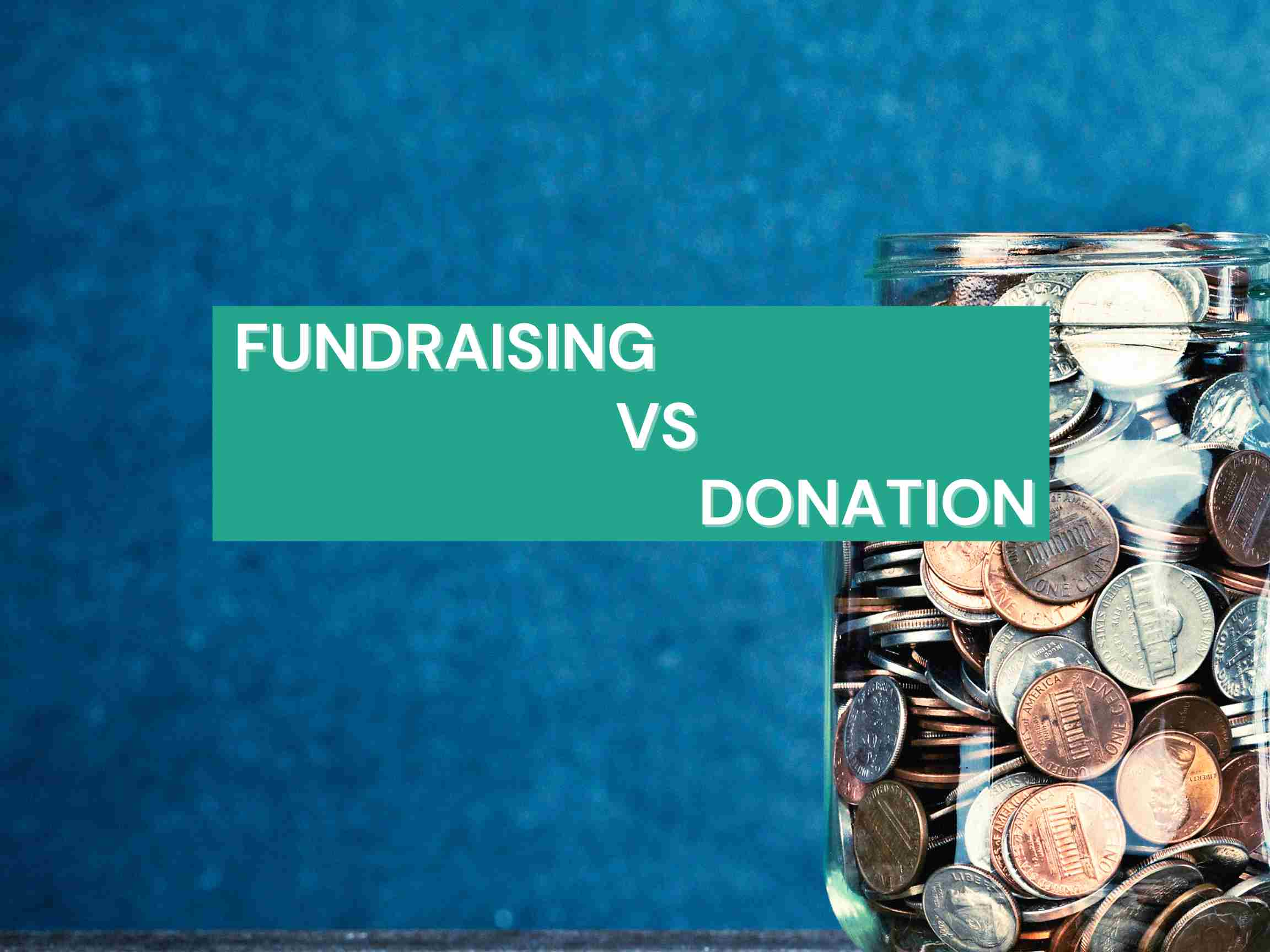Fundraising vs Donation? 12 Crucial Differences
This post may contain affiliate links. If you purchase through one of these links, I may receive a small commission at no extra cost to you. As an Amazon Associate, I earn from qualifying purchases.

Fundraising vs Donation – confused about these two commonly used terms?
This in-depth article would help you understand the difference between fundraising and donation. You would know exactly how fundraising works, what are the primary fundraising causes, how fundraising is planned, and how fundraising is different from donation in all the various aspects.
Let’s get our fundraising basics sorted.
Fundraising vs Donation: 12 key differences

1. Fundraising vs Donation – Difference in Meaning
As per Oxford Dictionary,
– fundraising is ‘the activity of collecting money for a charity or organization, often by organizing social events or entertainments’ whereas
– donation means ‘something that is given to a person or an organization such as a charity, in order to help them; the act of giving something in this way
The biggest differentiator between fundraising and donation is that fundraising involves ‘collecting’ while donation involves ‘giving’.
In the following section, we would see how this difference plays out in the practical application of both terms.
2. Fundraising often demands planning, donations may not need any planning
Since fundraising involves collecting money and donation only requires giving money, fundraising is often a far more demanding process that requires careful planning.
As you would observe in our various articles on fundraising ideas like calendar fundraising, candle fundraisers, fundraising for kindergarten, etc, the first step of fundraising is always planning.
An ideal fundraising plan should be divided into
– setting a goal
– preparing an execution timeline and plan
– raising awareness and visibility through marketing activities
– tracking the progress of the fundraiser
On the other hand, since donation is an act of giving, it doesn’t need as much planning and preparation as fundraising. You could simply donate to charities, organizations, causes, or individuals of your choice. On an organizational level, you may need to plan your donations to comply with broader organizational goals, legal requirements, etc. But even then, the level of planning involved when giving donations is far lesser than the planning involved in setting up fundraisers.
Want to donate? Read all about the best charities for various causes here.
3. Fundraising is not a voluntary act, donation often is.
The very definition of fundraising implies that it is an act of collecting money, supplies, etc whereas donation is the act of giving money, supplies, etc.
This means that in order to fundraise, you need to reach out to people, create awareness regarding the cause for which you want to raise money, and entice, persuade, or convince people or organizations to give funds to you.
Donations, on the other hand, are the act of giving money. It is often voluntary as people and organizations, on their own free will, come forward to donate to a cause of their choice.
4. Fundraising efforts require manpower. A donation is often an individual act.
As stated above, if you want to raise funds, you need to create a fundraising campaign that involves many of the following tasks
– recruiting volunteers
– creating a marketing plan and promoting the fundraising campaign across various platforms
– reaching out to organizations and donors
– organizing fundraising events as per the fundraising idea you are employing for the fundraiser
– thanking donors
– reporting the fundraising collections, etc.
Donation is an individual act that can be undertaken either online or through physical or in-person donations of money or supplies. It doesn’t require any planning and hence the manpower requirements involved in donation are negligible.
5. Fundraising takes much longer than the act of donating
As stated above, if you want to raise funds for a cause you need to plan the entire fundraising campaign. The campaign as a whole from start to finish often takes a few weeks or a few months depending on the scale of the fundraiser.
Donations, on the other hand, can be done in a matter of minutes. It is a one-time activity that doesn’t take much preparation or follow-through.
6. Fundraising causes could be private or public whereas donation is often for a public cause
Fundraising could be done for
– causes with a wide impact like children’s healthcare, foster care fundraising, environmental issues, etc. or
– for private causes specific to the organization like raising funds for school supplies for your own school, raising funds to support your own sports team, fundraising for a personal trip, etc.
A donation is most often a selfless act done for the betterment of
– the society at large (for example – donating to children health care charities, environmental causes, NGOs working for human rights causes, etc)
– beneficiaries of a particular organization (for example – making donations for school raffle prizes)
– another person or individual in need
7. Fundraising attracts tax implications while donations earn tax benefits
Fundraising activities, particularly when conducted by registered non-profit organizations or charities, can have tax implications for both the fundraisers and donors. The specific tax regulations and benefits vary across different jurisdictions.
For fundraisers, there may be requirements to report and account for the funds raised, ensuring transparency in financial management. Tax obligations such as income tax or sales tax may apply to the funds collected through fundraising efforts, depending on the nature of the activities and the applicable tax laws.
On the other hand, donations made to qualified charitable organizations or non-profit entities may be eligible for tax benefits in some jurisdictions.
Donors may be able to claim deductions or credits on their tax returns for the donations made, reducing their taxable income and potentially lowering their overall tax liability. These tax benefits are often designed to incentivize and encourage individuals and businesses to support charitable causes and contribute to the betterment of society.
8. Fundraising requires marketing and publicity. Donation is often done privately
To make people give money for fundraisers, plenty of efforts need to be taken in marketing and publicity of the fundraiser.
Organizations need to prepare a marketing strategy that could involve using social media platforms, emails, in-person campaigning, print media publicity, etc.
Donating for a cause on the other hand doesn’t require any marketing or publicity. It is, in fact, done discreetly by many individuals and organizations out of a pure intention of generosity.
9. Fundraising attracts reporting requirements. Donations, in most cases, do not.
Fundraising undertaken by registered non-profit organizations, 501(c)(3) organizations, charities, and trusts requires the reporting of its income, expenses, and use of funds towards charitable purposes.
The reporting requirement is mandatory to avail of tax benefits, to maintain its registration as a non-profit entity, and to win the trust of donors with transparent disclosures.
Even organizations that are not registered as charitable organizations or as non-profits organizations undertake financial reporting to assure the donors that the money donated by them is appropriated for the cause for which it has been raised.
Donations do not need any financial reporting except when undertaken by entities legally required to engage in financial reporting.
10. Fundraising could be more creatively engaging than donating
Fundraising could be undertaken through various types of fundraising events like
– calendar fundraising, candle fundraising or other types of catalog fundraisers
– bake sale fundraising
– raffle events for fundraising
– school fetes
– walkathons or marathons
– talent shows
– …
The options for creatively raising funds are almost endless.
At the same time, fundraising campaigns could also reach out to sponsors, seek direct donations, engage in crowdfunding, get assistance from charities working for a specific cause, etc.
Donation as opposed to fundraising is a straightforward activity. Donations can be directly made to charitable organizations through their online fundraising portals, crowdfunding platform, charitable events, etc. Donating doesn’t require creative endeavors and is a fairly straightforward process.
11. Fundraisers often have targets. Donations may not have targets.
Fundraising initiatives typically set a specific target amount or goal to be achieved within a defined period.
The purpose of setting a target is to provide a clear objective for the fundraising campaign and create a sense of urgency or motivation among potential donors. This target amount or goal serves as a benchmark for measuring the success of the fundraising effort.
In contrast, individual donations can vary in size or frequency based on the preferences and capacity of the donors. There is no predetermined expectation or a set amount for individual donations.
Donors have the flexibility to contribute whatever amount they feel comfortable giving, whether it is a small or large sum. Donations can be one-time or recurring, depending on the donor’s personal choice or the nature of the cause they are supporting.
12. Fundraising may offer incentives or benefits, whereas donations are usually given without expecting anything in return
In fundraising efforts, organizations often incentivize individuals to contribute by offering tangible goods, exclusive experiences, and recognition. Tangible goods may include merchandise or tickets to events, while exclusive experiences can range from backstage passes to VIP access.
Incentives and benefits are offered to entice people into donating to the cause of the fundraiser.
Many organizations even follow through with thank-you notes, plaques, or certificates for donors to build a connection and encourage them into making recurring or ongoing donations.
Donations, unlike fundraising, are typically given without expecting any material benefits or incentives in return. Donors contribute to causes or organizations out of altruism, empathy, or a desire to make a positive impact. Donors may find emotional gratification in supporting causes they care about, knowing that their contributions are making a positive change in the world.
Correlation between fundraising and donation
While donation and fundraising are fundamentally different, they are two sides of the same coin. The interplay between fundraising and donation is like a beautiful dance that makes a real difference.
Here are ways in which fundraising and donations overlap and complement each other.
- Fundraising and donation are not two separate entities battling it out; they’re actually collaborators with a shared mission. Fundraising serves as the catalyst, igniting the spark that inspires individuals to give.
- Fundraising brings people together, raising awareness and creating a buzz around a cause or organization. Donation, on the other hand, is the ultimate act of kindness and support, fueling fundraising efforts. It’s a symbiotic relationship that empowers both parties to make a meaningful impact.
- By organizing events, campaigns, and creative initiatives, fundraisers create opportunities for individuals to get involved and donate. They shine a spotlight on the cause, showcasing its importance and inspiring others to open their hearts and wallets.
- Fundraising isn’t just about one-time donations; it’s about cultivating long-term relationships with donors. Effective fundraising is like building a friendship—it requires trust, communication, and appreciation. Fundraisers go the extra mile to engage donors, showing them the impact of their contributions and expressing heartfelt gratitude. This helps establish a sense of belonging and fosters loyalty among donors. And when donors feel valued and connected, they’re more likely to continue supporting the cause and become ambassadors themselves.





